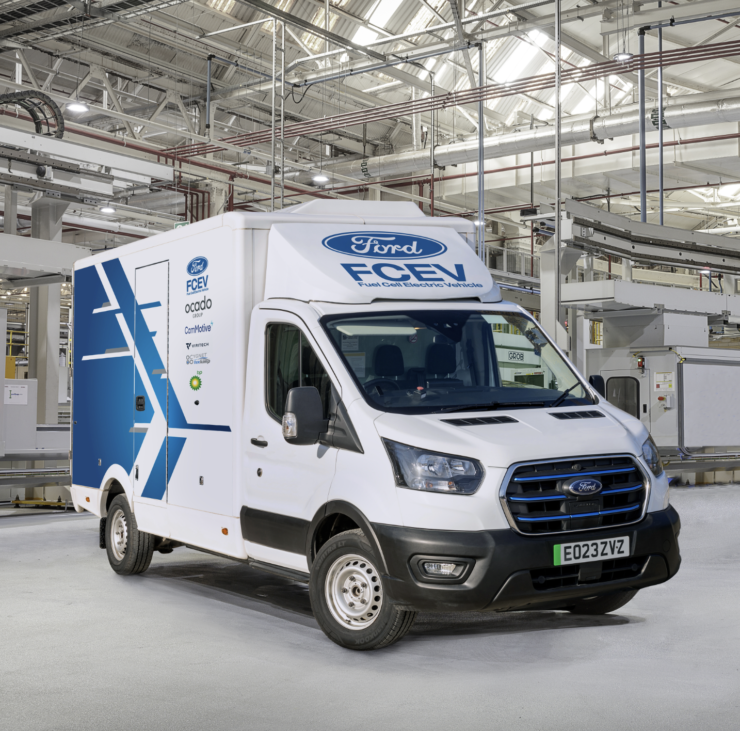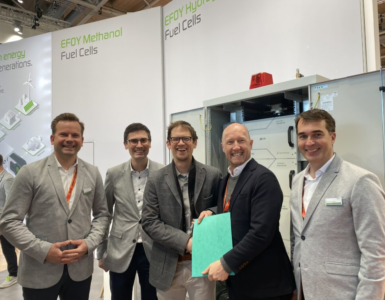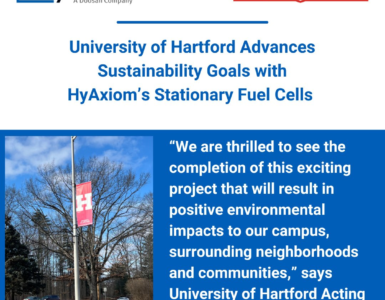Ford announces three-year hydrogen fuel cell E-Transit trial.
Ford is spearheading research into the potential for hydrogen as an on-board energy source for its acclaimed E-Transit.
The project will establish if hydrogen fuel cell technology can deliver more zero-emission range to heavy-use E-Transit customers travelling high mileages, with maximum loads, ancillary equipment such as chillers and with limited charging opportunities in the working shift.
Part funded by the Advanced Propulsion Centre (APC), Ford’s consortium of six automotive technology leader and fleet operator partners will help to determine the supporting hydrogen refuelling infrastructure required.
🔥 What about we co-host a webinar? Let's educate, captivate, and convert the hydrogen economy!
Hydrogen Central is the global go-to online magazine for the hydrogen economy, we can help you host impactful webinars that become a global reference on your topic and are an evergreen source of leads. Click here to request more details
Ford Pro, the company’s commercial vehicle (CV) and services division, will use the pilot to expand its conversion expertise, supported by engineers and E-Transit specialists from Dagenham and the company’s nearby Dunton Technical Centre, in Essex.
Tim Slatter, chair of Ford in Britain, said:
Ford believes that the primary application of fuel cells could be in its largest, heaviest CVs to ensure they are emission-free, while satisfying the high daily energy requirements our customers demand.
“Ford has an unmatched history in the commercial vehicle sector with the indomitable Transit, and we are excited to be exploring new ways to make clean deliveries an option for even our hardest working vans on the road.”
Integrating zero-emission auto tech
Ford’s hydrogen fuel cell E-Transit project with the APC will validate the vehicle’s business case by linking Ford expertise as 57-year UK van market leader with fuel cell powertrain experts and fleet operators including Ocado Retail.
Other partners on the project are bp, capturing hydrogen usage and infrastructure requirements; Cambustion, testing the fuel cell system; Viritech, designing hydrogen storage systems; and Cygnet Texkimp, providing the pressure vessels’ carbon fibre tooling.
Hydrogen fuel cells produce electricity by combining hydrogen from an onboard tank with oxygen, with resulting zero emissions, extended range and quicker refuelling. Ford has researched fuel cell technology since the 1990s, developing many prototypes and demonstrating the first-generation E-Transit fuel cell vehicle at the CENEX Low Carbon Vehicle Show in 2021.
A low-volume test fleet of eight fuel cell Ford E-Transits will run for six-month periods over the three-year project to 2025. Test fleet data will provide insights into the total cost of owning and operating a large van, with increased range and operating hours to match its diesel-powered equivalent and without the need to charge.
The prototype Ford E-Transits will be fitted with a high-power fuel cell stack, in conjunction with significant hydrogen storage capability, optimised for safety, capacity, cost, and weight. An important project element will evaluate efficient and viable recycling for end-of-life components.
Dagenham vision
Ford imports Transits, which are assembled in Turkey, via its own river jetty at Dagenham – part of the Thames Freeport zone which has received Government go ahead.
This E-Transit fuel cell project supports Ford’s strategic vision of creating low-volume assembly upfit capability for hydrogen vehicles, with upscaling potential, to add to workforce skills and to develop the hydrogen economy. Trial vehicles will test current and future needs for the alternative fuel in the Thames Estuary area.
Ford Dagenham’s location in the Freeport zone, also served by Ford’s own railhead and the adjacent A13 / M25 road connections, has already attracted partners onto the estate such as MS-RT.
Road to better
The hydrogen E-Transit project supports Ford’s ‘Road to Better’ sustainability commitment, evidencing how its European operations are to be its first region globally to become carbon neutral by 2035. Ford has reduced emissions from global manufacturing facilities by 40 per cent since 2017, including at Dagenham where last year’s energy efficiencies realized savings worth £11,500 a day.
About Ford Motor Company
Ford Motor Company (NYSE: F) is a global company based in Dearborn, Michigan, committed to helping build a better world, where every person is free to move and pursue their dreams. The company’s Ford+ plan for growth and value creation combines existing strengths, new capabilities and always-on relationships with customers to enrich experiences for customers and deepen their loyalty.
Ford develops and delivers innovative, must-have Ford trucks, sport utility vehicles, commercial vans and cars and Lincoln luxury vehicles, along with connected services.
The company does that through three customer-centered business segments: Ford Blue, engineering iconic gas-powered and hybrid vehicles; Ford Model e, inventing breakthrough EVs along with embedded software that defines exceptional digital experiences for all customers; and Ford Pro, helping commercial customers transform and expand their businesses with vehicles and services tailored to their needs. Additionally, Ford is pursuing mobility solutions through Ford Next, and provides financial services through Ford Motor Credit Company. Ford employs about 174,000 people worldwide.
Ford of Britain has been sales leader in the U.K. for commercial vehicles for 57 consecutive years. The U.K. is Ford’s third-largest global market and accounts for around 30 per cent of total Ford vehicle sales in Europe.
Ford is pursuing leadership positions across mobility and electrified vehicles, launching 16 hybrid and electric vehicles in 2020/21. Ford directly employs around 7,000 people in the U.K., with thousands more employed in its extensive dealer network.
The Ford Britain Dunton Campus in Essex is the home of its European commercial vehicle business group, the Ford of Britain national sales company, Ford’s banking arm – Ford Credit Europe – and powertrain engineering. UK manufacturing operations export 85 per cent of engines and transmissions produced to more than 15 countries on six continents – valued at £2.1 billion annually.
Highlights:
- Ford leads innovation consortium testing hydrogen fuel cell technology on all-electric E-Transit
- Delivery van operators to benefit from zero-emission vehicle’s extended range and quicker refuelling
- Small UK-based prototype fleet to run as part of wider alternative fuel research project
- Vehicle conversion by Ford Pro commercial experts
Ford announces three-year hydrogen fuel cell E-Transit trial, DAGENHAM, U.K., May 9, 2023








